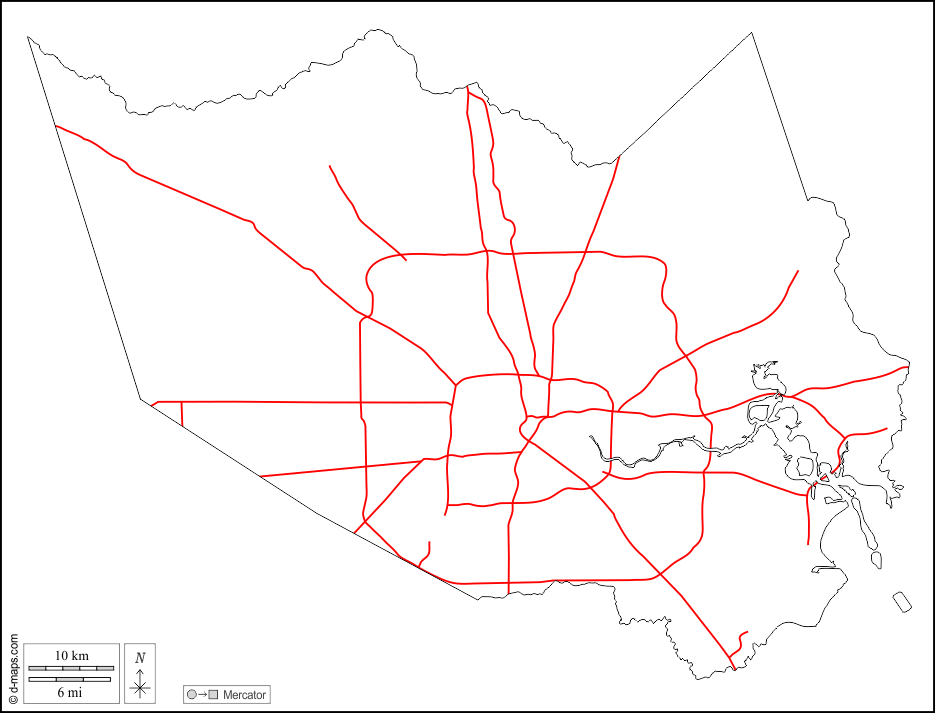Everything You Need to Know About the Harris County Texas Court System

Welcome Texas court system navigators! When you are a resident of Harris County, you need to stay informed on how the court system works. Whether you are interacting with the Texas court system as a citizen, a witness, or a litigant, understanding how it works is a vital part of maintaining your rights and responsibilities. That’s why in this blog post, we’ll be exploring everything you need to know about the Harris County Texas court system. We’ll cover court structure, filing processes, and even the different court options available. By the time you’re finished reading, you’ll have a good grasp of the Texas court system and how take advantage of all the resources available.
The Harris County Texas Court System comprises of seven different courts, including the District Courts and County Courts both civil and criminal. This system also includes specialized courts such as Juvenile Courts and Probate Courts.
Introduction to The Harris County Court System
The Harris County Court System is the judicial branch of government responsible for handling civil and criminal cases. It serves as the central court system for Harris County, providing an efficient and effective means for representing justice by resolving legal disputes in a fair, impartial manner. Composed of various trial and appellate courts, the Court combines many aspects of Texas state and federal law to protect individuals’ rights, privileges, and interests while addressing public safety concerns.
It is no secret that the U.S. legal system can be confusing and overwhelming, especially to those unfamiliar with its complexities. That said, understanding how the court system works within Harris County is essential in knowing what your rights are during civil proceedings or criminal trials. The justice it provides lifts heavy burdens off citizens, ensuring reliable access to legal services when needed most.
For such a complex system to work efficiently and evenly, there must be rules and regulations established for everyone involved in court proceedings. Understanding the jurisdiction of these courts is paramount in mastering the legal process and fully appreciating the justice each of them upholds.
The Harris County Court System is the judicial branch of government in charge of civil and criminal cases, which upholds people’s rights and delivers justice through a combination of Texas state and federal laws. Understanding how the court system works within Harris County is essential for understanding one’s rights during legal proceedings. Knowing the jurisdiction of these courts is important for properly navigating the legal process and appreciating the justice it provides.
Jurisdiction of the Harris County Court System
The jurisdiction of the Harris County Court System, which is affiliated with all courts in the county including the district, probate, and juvenile courts, provides a full range of judicial proceedings for the citizens of Harris County. The Court has jurisdiction over criminal matters such as misdemeanors, felonies, violations of state laws, and juveniles, along with civil cases involving disputes between two parties or governmental agencies. Depending on the case, Texas appellate courts have an additional layer of jurisdiction; if a defendant believes his or her constitutional rights have been violated during trial or conviction there may be grounds to appeal the verdict based on statutory law and precedent set by prior court rulings.
Jurisdiction means that the court has the final say-so when it comes to deciding a particular matter; any decision made by the court is legally binding. This is why it’s important to first determine what type of case falls within the court’s jurisdiction before filing a claim. For instance, certain small claims cases such as landlord-tenant disputes may be handled quickly by an administrative hearing instead of being brought to court. Depending on whether or not an individual or business needs to enforce a contract or win damages – these can either be litigated through civil court or taken care of administratively.
With this in mind, understanding how jurisdiction plays out in Harris County court system can help people make more informed decisions when it comes to filing legal documents and determining who will hear their case.
How Does Jurisdiction Work in the Harris County Court System?
Jurisdiction is an important factor in the Harris County Court System. It determines what matters can be heard by which court, and whether a court can resolve a particular dispute. The jurisdictional rules for any given court system depend on state laws and constitutional principles, so it’s important to understand how local law applies to Harris County.
Generally, the Harris County Court System will have jurisdiction when any of the parties involved resides in the county or the controversy arose in the county. This includes criminal cases, bankruptcies, civil cases, family law issues, probate matters and all other types of cases. There are some exceptions where, if all of the parties involved reside outside of Harris County, then jurisdiction may not exist. Additionally, certain specialized courts like juvenile or mental health courts may have more restrictive jurisdictional requirements than other courts in Harris County.
Of course, each case is unique and it’s always best to consult with an experienced attorney who is familiar with Texas law and the Harris County Court System to determine whether a given court has jurisdiction over your matter. An attorney will also be able to explain any potential complications that might arise from forum shopping or from transferring a case from one court to another.
These same principles apply when seeking assistance from appellate courts in Harris County. Although appellate courts don’t hear facts about a case directly from witnesses or parties involved as trial courts do, they are still bound by jurisdictional limits dictated by state law and the United States Constitution.
Understanding jurisdiction is key in properly administrating justice within the Harris County Court System. Decisions about jurisdiction should be well-informed and reasoned so that everyone receives fair and just treatment under the law.
- The Harris County Courthouse complex is the largest state court courthouse in the nation, with 90 courtrooms located in one building.
- In 2019, Harris County had an estimated 11.95 million civil and criminal case filings.
- The Harris County District Clerk’s Office has over 8,000 people on staff who handle paperwork and files in both civil and criminal cases.
Administrating Justice in The Harris County Court System
Administrating justice in the Harris County Court System is essential to promote and uphold the laws of this country. This administration starts with cases being watched over by the Judge who acts as a fair arbiter in making sure that justice is served regardless of bias or prejudice. In some jurisdictions, the capacity of a judge could be both administrative and appellate due to lack of resources. However, in Harris County, each type of court has its own presiding Judge who makes rulings concerning matters within their jurisdiction. These judges are elected officials who have experience and vast knowledge of the law and show impartiality when making decisions. The transparency of cases presented in front of them aims to ensure equity in decision-making and encourages people to feel comfortable accessing the system of justice.
In addition to judicial power, there are also administrative officers who manage the court itself like court clerks, law secretaries, calendar clerks, etc., all involved in the day-to-day operations. Ultimately it is their responsibility to make sure that all procedures are taking place according to legal regulations allowing the court to operate effectively. The last group of officials providing input for proper administrating are: court reporters, interpreters, bailiffs, prosecutors and defense attorneys—all working together to provide balanced perspectives from every angle within a case thus contributing towards a sense of fairness and trustworthiness.
The ability for Administration in the Harris County Court System to ensure fairness while carrying out its duties is critical for upholding justice throughout the county. Although certain cases may raise debates surrounding certain aspects of a law or statute, these officials work diligently to ensure that decisions are based on honesty and integrity without influence nor favoritism.
Laws and Procedures that Govern the Harris County Court System
When it comes to administering justice in the Harris County Court System, laws and procedures play a major role. Depending on the case being argued, multiple laws may be considered, including federal and state legislation. Public defenders and defense attorneys representing their clients must have an in-depth understanding of what laws are applicable and how best to proceed legally. Similarly, prosecutors must also be well-versed in the legal protocols that must be followed in order for a case to conclude with a just resolution for all parties involved.
Regarding criminal law within the Harris County Court System, some may argue that punishments are too strict or too lenient depending on the severity of the crime committed. On one hand, advocates for harsher sentences point to deterrents such as incarceration as a means of reducing crime; however, those that advocate for more lenient sentences believe that rehabilitation is typically more beneficial than punishment when it comes to non-violent offenders. While valid arguments can indeed be made on both sides of this debate, ultimately the decision of how a court should handle sentencing is up to its presiding judge. It is these legal authorities who are entrusted with making such decisions based off a number of factors when charged with administering justice within their court system.
No matter what type of case is being argued or considered before a court of law in Harris County, knowledge and adherence to proper legal procedures must be carefully observed if a just verdict is expected from all parties held accountable. As this section has explored, disagreements can arise when arguing which laws should or should not be applied related to any case; yet at the end of the day it will be up an individual’s interpretation of these same laws that ultimately decide guilt or innocence and/or appropriate sentencing.
Attorneys and Staff in the Harris County Court System
The attorneys and staff within the Harris County Court System handle a wide variety of duties, from making sure the legal process is adhered to, to ensuring that the rights of all parties are protected. Attorneys assigned to cases must be able to navigate complex rules and laws, and make sure that their clients’ interests are represented in court. It is also important for attorneys to be knowledgeable about the most up-to-date case law and precedent for their clients’ matters, which is why much of the Harris County Bar Association is devoted to continuing education programs.
Staff members play an equally important role in keeping the court system running smoothly. The Administrative Office of the Courts is responsible for providing administrative support to courts throughout Harris County. These dedicated professionals maintain records, process paperwork, manage personnel decisions, and work with vendors and clerks to ensure all duties are completed on time while maintaining accurate information regarding court events.
Additionally, Interpreters are integral to many proceedings in the Harris County Court System as they provide translation services for individuals who are not proficient English speakers, ensuring that everyone has access to justice regardless of language barriers. Language interpreters have the responsibility of accurately conveying messages between those with limited English fluency and those for whom English is a first language. Interpreters must also remain impartial at all times so as not to sway proceedings or decisions with subjective judgement or personal opinion.
The attorneys and staff members within the Harris County Court System provide crucial support for both attorneys and citizens involved in legal proceedings. Their timely responses, attention to detail, and dedication ensure that justice is served fairly and efficiently within Harris county. As documents from every case in court must be managed correctly and securely, transitioning into the next section about “Cases and Documents in the Harris County Court System” will provide an overview on how records are kept by this court system.
Cases and Documents in the Harris County Court System
When looking at the Harris County Court System, it is important to understand how cases are conducted and documents filed in the system. As a court of record, all proceedings in the county must be kept on file for the public. It is also important to note that the court employs attorneys and staff to work on cases and make sure all documents are filed correctly.
In general, cases must include records of summons and complaints filed with the Court by attorneys or other parties involved in the case. Documents that accompany it can range from contracts or other paperwork related to the case. The attorneys handling the case will then be held responsible for its accurate filing. If an attorney lacks experience or fails to turn in correct paperwork, this can have an adverse effect on their client’s case. Therefore, it is imperative that they are familiar with court filing strategies, as well as any applicable laws or regulations regarding the kind of case being handled.
The process continues with subpoenas, discovery requests, motions, scheduling deadlines and directives from the presiding judge(s). Document production is often part of discovery itself and may include requests for documents such as contracts, notes, invoices, letters, emails and more. For a case to move forward swiftly and efficiently all entities involved must cooperate throughout the process. Therefore, having professional representation from experienced court personnel is important in order to create a successful outcome for both sides in a civil dispute.
Ultimately this careful attention to detail from everyone involved should result in smoother transactional processes when concerning cases within the Harris County Court System.
Types of Cases that Occur in the Harris County Court System
The Harris County Court System handles a variety of cases, and each court has specific areas of focus. For example, criminal and family courts hear specific types of cases. Civil courts hear disputes between private parties, while criminal courts handle violations of state laws. The Probate Court largely deals with the processes related to wills and estates.
Within the Criminal Courts, there are three separate types of offenses known as felonies, misdemeanors and appeals. Felony offenses are the most serious crimes such as murder and rape, while misdemeanors are less-serious charges, such as traffic violations and theft. Appeals relate to any prior rulings by lower courts that a defendant wishes to challenge.
In the Family Courts, there are various types of matters handled, such as divorces, child support, properties division and adoptions. Other domestic relations cases can include unmarried parents seeking to establish paternity or visitation rights.
Meanwhile in the Civil Division, proceedings involve all sorts of civil actions with monetary or non-monetary damages such as contract disputes, landlord/tenant issues and personal injury suits.
The Harris County Court System handles numerous cases daily and provides resources for those dealing with any one of these types of cases. Understanding the different types of cases heard in the court system is an important part of navigating through it successfully.
Appeals in The Harris County Court System
When a person has had their case heard in the Harris County Texas Court System but disagrees with the outcome, they may appeal the decision to take it before another more senior court. Appeals in the Harris County Court System are designed to allow a higher court to review a lower court’s decision for errors of law or fact that may have occurred during the trial process.
For civil cases in Harris County, appeals usually go through either the Fourteenth District Court of Appeals or the First District Court of Appeals. The party appealing must generally file a Notice of Appeal within 30 days and then wait up to six months for their case to be heard by a judge. During an appeal process, parties may present additional evidence, witness testimony, and legal briefs before arguing their cases.
Debate regarding appeals in Harris County is often split between those who support increased access to appeals processes and those who lean towards limiting them. Those in favor of easier access to appeals argue that innocent people should not necessarily suffer if an error was made on behalf of the courts and that errors can often occur; highlights include some high-profile exonerations from death row inmates. Alternatively, opponents of easily accessible appeals point out that re-litigating cases can be costly financially and emotionally for both sides involved, as well as clogging up our already overburdened judicial system.
In many cases, the law is quite clear about when an individual is allowed an appeal– for instance, convicted felons have automatic rights to appeal decisions– but oftentimes this debate continues in matters where laws are not so concrete. Ultimately, whether or not an appeal will be allowed is decided by the presiding judge based upon the merits of each case – which further emphasizes the importance of understanding when civil rights may be infringed upon or mistakes were admittedly made within the judicial system itself.
Frequently Asked Questions
What types of cases are heard in the Harris County Texas Court System?
The Harris County Texas Court System hears a wide range of cases, including civil, criminal, family and juvenile cases. Civil matters may include contract disputes, civil wrongs (torts), property damage and foreclosure actions. Criminal matters may include traffic violations such as speeding and reckless driving, as well as more serious charges such as assault or robbery. Family cases could involve issues like adoption and custody, while juvenile courts handle delinquency proceedings for adolescents under the age of 17 who have been charged with a crime. All of these hearings require the use of the court system to ensure justice is served.
What laws and regulations does the Harris County Texas Court System adhere to?
The Harris County Texas Court System adheres to a number of state and federal laws and regulations which govern the conduct of its proceedings. These laws include the Texas Constitution, the Texas Government Code, the Texas Code of Criminal Procedure, the Texas Rules of Civil Procedure, the Local Rules of Harris County, among others. At a federal level, The U.S. Constitution, Federal Rules of Evidence, Federal Rules of Civil Procedure, and applicable federal statutes are applicable.
These laws provide the framework for the Harris County Texas Court System by establishing procedures for filing documents, scheduling court dates and trials, issuing orders and judgments in cases, protecting attorney-client privilege, resolving disputes between parties via alternative dispute resolution, and enforcing court orders. All decisions made in a specific case must be based on existing law or established legal precedent as interpreted by the presiding judge or jury.
How do I file a case in the Harris County Texas Court System?
Filing a case in the Harris County Texas Court System is fairly straightforward. Firstly, you should locate your local courthouse and determine which court has jurisdiction over your case. In Harris County, there are four county courts that offer a wide range of civil and criminal services, including justice of the peace for small claims. If you have a family law issue, you must visit the Family Courts Center.
Once you’ve determined the correct court, you can begin filing the appropriate paperwork. Generally, this includes:
1) initiating documents, such as a petition or complaint;
2) notices to affected parties;
3) service documents, such as a citation or writ;
4) responsive pleadings; and
5) any accompanying documents. You may need to hire an attorney to help you complete certain paperwork or meet certain deadlines.
Be sure to carefully read all instructions included within each document and ensure that you submit them accurately and on time. Additionally, some courts may require additional steps be taken before filing your case (such as attending pre-trial mediation). Lastly, there will likely be fees associated with filing the case and serving related notices and orders.







